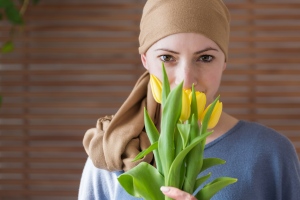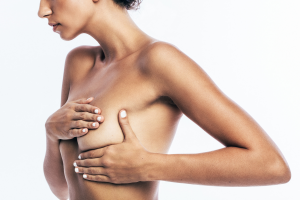The following information is a summary of Dr. Katrina Mitchell’s presentation for the LCGB (Lactation Consultants of Great Britain) Conference 2021. Katrina is a breast surgeon and IBCLC, and her presentation was filled with incredible information relating to breast cancer and pregnancy/lactation.
I am in no way looking to take credit for any of the following information, but I feel it is too good not to share with you. I have obtained Dr. Katrina’s consent in posting this content. Warning: The following information may be triggering for some people. My intention is to inform, not upset anyone.

To begin with…
Katrina is eager to clear up some of the misconceptions about the relationship between breast cancer and pregnancy/lactation. It is commonly reported that if women breastfeed, they are protected from getting breast cancer, which is true but is not as straightforward as that.
She discusses the “crossover effect”, which describes how women that are in the years of pregnancy and breastfeeding are at an increased risk of developing breast cancer but this converts to increased protection post-menopause. This is because of the significant changes that a woman’s breast tissue undergoes, at a cellular level. From the moment a woman becomes pregnant, her breast tissue undergoes significant change. When a woman breastfeeds, her breast tissue undergoes change again, and after weaning from breastfeeding there is the process of returning to a pre-pregnant state.
That is not to say that only women who breastfeed are at an increased risk. In fact, the evidence suggests that breastfeeding is protective, as it supports the proliferation of mammary cells after pregnancy, and that these cells are less likely to become cancerous. In addition, when a woman is weaning from breastfeeding, the processes involved in removing the no longer needed tissue and structures also removes cells with initial DNA damage (Anstey et al 2017).
In a study by the Collaborative Group on Hormonal Factor in Breast Cancer it was found that there is a 4.3% lifetime risk reduction for every 12 months of breastfeeding.
Katrina states that if you have a 1st degree relative/BRCA1 mutation, you will see the greatest benefit from breastfeeding.

Breast cancer and Pregnancy
There is a perception that a person should not get pregnant after having breast cancer. However Katrina states there is actually a decreased risk of dying if you have a pregnancy after breast cancer, and the sooner the better!!!
Firstly, many of the tests and screening for breast cancer are safe while you are pregnant.

The following are safe:
- Biopsy
- Ultrasound
- Mammogram. You will need to wear a protective cover for the mammogram, but Katrina states you would experience more radiation by getting on a plane than via mammogram
- Chest X-ray (again you will be given a protective cover)
- Liver ultrasound
- MRI without contrast
- MRI brain
- ECHO (heart ultrasound)
Chemotherapy
Chemotherapy is also safe in pregnancy (not in the 1st trimester). It does not cross the placenta. If a woman needs chemotherapy, it is usually stopped at 35/36 weeks gestation in order to give her body time to recover immunity before the birth. However, the earlier in pregnancy chemo is started, and the more cycles, the more lactation can be affected.
Radiation
Radiation is not safe during pregnancy. Radiation causes a decrease in breastfeeding capacity (milk making tissue). Milk from a breast that has undergone radiation is saltier in taste, and the nipple can be tougher. For these reasons baby’s can find it difficult to latch, and may not like the taste when they do. Also supply is reduced.
Breast Cancer and Breastfeeding
It is reassuring to know that biopsies are safe and effective. Even if a fistula (a channel where the needle went in) develops and milk leaks out, it usually self- resolves over time. The advice is to feed normally after a biopsy, and don’t pump to keep the breasts ‘drained’. This would cause engorgement and an unnecessary increase in supply which could cause issues such as blockages and mastitis.

Tests that are safe to have while breastfeeding:
- CT with contrast (no need to interrupt breastfeeding)
- MRI with contrast (no need to interrupt breastfeeding)
- PET scan (mum and baby will need to be separated for 12 hours due to the increased radioactivity, but mums breastmilk can still be given to the baby.
See the ABM Protocol #31, if your physician or GP is unsure of what tests are suitable while breastfeeding. It would be very upsetting to be advised incorrectly to stop breastfeeding unnecessarily, especially at a time of such uncertainty and emotional upheaval.
Chemotherapy and Breastfeeding

Katrina does not recommend breastfeeding while having chemo for the following reasons:
- Baby will be unable to feed during the cycles (usually 3 weeks in duration). Therefore your baby may end up latching for only a 24 hour period every 3 weeks.
- Milk production will be significantly reduced by the chemo.
- Potential nipple trauma and breast refusal issues when baby has been fed by an alternate method for so long.
- The priority is saving the mothers life, therefore anything that may put her body under added strain or be a source of infection during a time of reduced immunity is best avoided.
- Donor breast milk is encouraged by Katrina as an alternative for these mums (ABM Position Paper on Informal Milk Sharing).
In Conclusion
- Breastfeeding is protective against breast cancer, and breastfeeding for >12 months will reduce your lifetime risk by 4.3%.
- Even if you breastfeed/breastfed, you still need screening like everyone else.
- If you have accessory breast tissue, this also needs to be screened.
- Chemotherapy is safe in pregnancy (except for the 1st trimester), but not while breastfeeding.
- Radiotherapy during pregnancy will impair lactation to that breast.
One thing that Katrina stresses is that post-partum breast cancer is different to cancer that develops in pregnancy. If there are any signs of breast cancer, then urgent action and screening is advised. See the HSE for further info on signs of breast cancer and what to do next. It is so important to check your breasts at least monthly, even while pregnant and breastfeeding. A lump that is not responding to feeding, or antibiotics needs further investigation. Check out my blog post Blocked Ducts and Mastitis for further information.
For further information on Breast Cancer and Breastfeeding, you can visit Katrina’s new website here, which is really beautiful and packed with information on all things breastfeeding.

